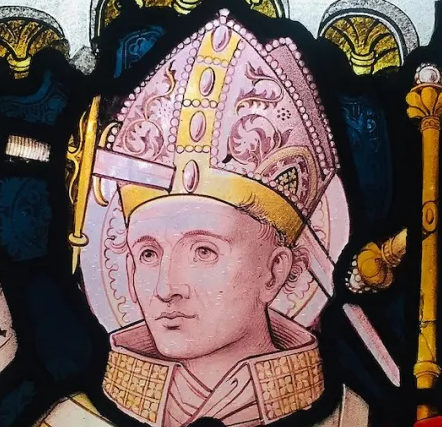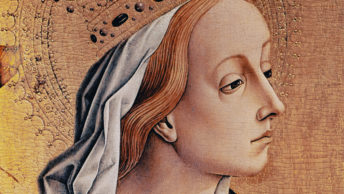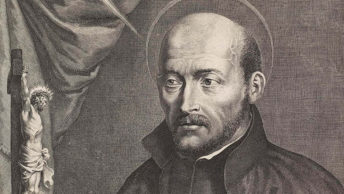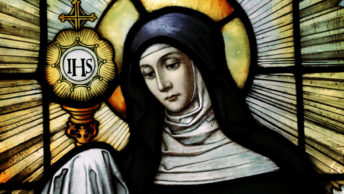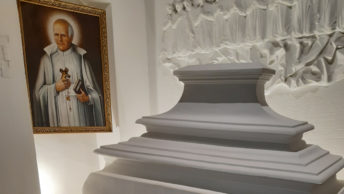On December 29th, we celebrate the feast of St Thomas Becket. The more I tend to read his life the more I realise what truly loving God at the highest price of paying one’s life essentially means.
Thomas was born on December 21, 1117, in Southwark, England. From his early days his father, Gilbert Becket, an English nobleman, noticed that his son Thomas was specifically gifted by both nature and grace to be of great good to others. Thus, he instinctively felt that one day his son would be an important servant of Christ. With this intent in mind he sent him to a monastery in order to receive a solid education. The first employment Thomas got was that with the London police. Thanks to this work he was able to learn thoroughly the different rights of both the Church as well as the secular authority. The more he delved deeper in his work Thomas could not bear the blatant injustices the clergy were constantly submitted to embrace day after day. Hence, because his conscience objected to all this shameless injustice, Thomas simply opted to leave his work altogether.
Upon leaving the secular arm Divine Providence had it that he got employed by the Archbishop of Canterbury. In fact, the latter sent Thomas on missions abroad, namely to Rome and allowed him to study civil law at Bologna University for a whole year. His faithful service to the Archbishop made the latter entrusting him with even more responsibilities. Thus he made him his Archdeacon and bestowed on him with many benefices. Thomas’ accountability spoke also to the king who designated him his Lord Chancellor. In virtue of that high office Thomas tried to balance justice on one side with mercy on the other. Whilst he was just in justice’s rendition he was also generous and caring in the alleviation of misery. Thomas put God before his personal needs. He spent alot of time during the night praying. He fought himself to free himself from any carnal temptations.
Thomas was surely a man of principle. While warring against France he earned the respect of his enemies, especially that of the young king Louis VII. In front of such a great man of utmost integrity king Henry II entrusted to him the education of the crown prince. Since for Thomas the formation of the future king together with young lords was pivotal he dedicated much time to educate them solidly.
Following the death of Archbishop Theobald of Canterbury the king wanted to consecrate Thomas as Archbishop. Thomas wisely advised the king that had he consecrated him Archbishop of Canterbury their friendship would suffer. Thomas felt deep down that he could not compromise his obligations to defend the rights of the Church against the violation by the secular sovereign. King Henry II constrained Thomas to submit. As soon as he was consecrated Archbishop, Thomas immediately found himself in an unavoidable conflict with the sovereign, who was not at all different from his predecessors. The newly consecrated Archbishop stood his ground against the king’s courtiers’ list of royal customs at Clarendon, where Henry obliged both bishops and lords to adhere to them as they were. If one were to look at them objectively several of them just infringed the liberties of the Church whereas others were simply invented to suit the occasion. Thomas conscientiously opposed them. Consequently he became the number one enemy of the monarch and of the signatories of that infamous agreement between both parties.
Thomas fled to France for his safety and lived under the protection of Louis VII. The French monarch opposed any efforts by Henry who tried to make both Louis and Thomas enemies. The Archbishop of Canterbury retired to a Benedictine monastery for two years. In the meantime king Henry composed an intimidating letter to the abbot. Following the six year period in France, Thomas was designated by the Pope as his apostolic legate to preach and enforce order in his See of Canterbury. By this appointment Thomas knew that he was returning back to his country for his eventual martyrdom. Some say that Mary appeared to Thomas whilst in France to prepare him for the martyrdom. She purposely handed over to him a red chasuble. The entire Christian Europe supported Thomas and demanded from Henry reconciliation.
The vicious Henry convinced certain courtiers, who by the time hated Thomas, to break into the monastery and kill Thomas. And that is what these assassins precisely did. They entered the chapel when the prelate was assisting Vespers and brutally killed him before the altar by means of violent blows by their daggers on his head. While dying Thomas said: I die willingly, for the name of Jesus and for the defense of the Church.
Thomas Becket was canonized by Pope Alexander III on Ash Wednesday, 1173, not even three years after his death on December 29, 1170. The message sent to the contemporaries, especially to the king of England, was that no monarch ought to meddle with Jesus Christ and the Church’s liberties. Not even an arrogant king as Henry II certainly was.
St Thomas teaches us that if we want to let the Holy Spirit sanctify us we have to do our part too. We have to say no to what is earthly and yes to what is heavenly, even at the cost of our lives. In a letter the holy Archbishop of Canterbury communicates exactly this point when he writes:
If we who are called bishops desire to understand the meaning of our calling and to be worthy of it, we must strive to keep our eyes on him whom God appointed high priest for ever, and to follow in his footsteps. For our sake he offered himself to the Father upon the altar of the cross. He now looks down from heaven on our actions and secret thoughts, and one day he will give each of us the reward his deeds deserve.
As successors of the apostles, we hold the highest rank in our churches; we have accepted the responsibility of acting as Christ’s representatives on earth; we receive the honor belonging to that office, and enjoy the temporal benefits of our spiritual labors. It must therefore be our endeavor to destroy the reign of sin and death, and by nurturing faith and uprightness of life, to build up the Church of Christ into a holy temple in the Lord.
There are a great many bishops in the Church, but would to God we were the zealous teachers and pastors that we promised to be at our consecration, and still make profession of being. The harvest is good and one reaper or even several would not suffice to gather all of it into the granary of the Lord. Yet the Roman Church remains the head of all the churches and the source of Catholic teaching. Of this there can be no doubt. Everyone knows that the keys of the kingdom of heaven were given to Peter. Upon his faith and teaching the whole fabric of the Church will continue to be built until we all reach full maturity in Christ and attain to unity in faith and knowledge of the Son of God.
Of course many are needed to plant and many to water now that the faith has spread so far and the population become so great. Even in ancient times when the people of God had only one altar, many teachers were needed; how much more now for an assembly of nations which Lebanon itself could not provide with fuel for sacrifice, and which neither Lebanon nor the whole of Judea could supply with beasts for burnt offerings! Nevertheless, no matter who plants or waters, God gives no harvest unless what he plants is the faith of Peter, and unless he himself assents to Peter’s teaching. All important questions that arise among God’s people are referred to the judgment of Peter in the person of the Roman Pontiff. Under him the ministers of Mother Church exercise the powers committed to them, each in his own sphere of responsibility.
Remember then how our fathers worked out their salvation; remember the sufferings through which the Church has grown, and the storms the ship of Peter has weathered because it has Christ on board. Remember how the crown was attained by those whose sufferings gave new radiance to their faith. The whole company of saints bears witness to the unfailing truth that without real effort no one wins the crown.
St Thomas Becket pray for us.

